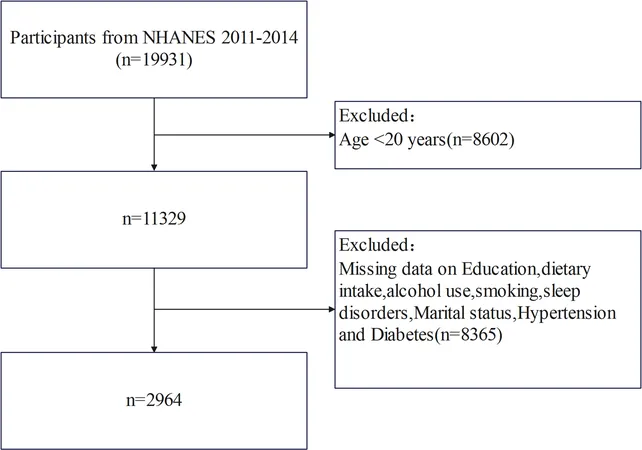
Could Your Diet Be Ruining Your Sleep? Shocking Insights from NHANES Data!
2025-07-08
Author: Mei
The Intriguing Link Between Diet and Sleep Disturbances
Sleep disturbances are becoming a serious public health issue, especially among those battling chronic conditions like obesity and diabetes. Recent data from the National Health and Nutrition Examination Survey (NHANES) from 2011 to 2014 reveals alarming trends linking poor dietary habits to declining sleep quality, which, in turn, contributes to severe health issues such as cardiovascular diseases and immune dysfunction.
Study Overview: What Did They Find?
In a groundbreaking analysis involving nearly 3,000 NHANES participants, researchers examined the interplay between dietary patterns and sleep quality. They studied four critical dietary indices, including the Dietary Inflammatory Index (DII) and the Mediterranean Diet Index (MED). Utilizing complex statistical methods, they aimed to determine how these dietary habits influenced sleep disturbances.
Key Findings: Your Plate Affects Your Pillow!
The results were striking! Higher scores on the DII, indicative of an inflammatory diet, correlated with increased sleep disturbances. However, when controlling for other factors, this correlation didn’t hold strong. Conversely, those scoring low on the Healthy Eating Index (HEI-2015) and Mediterranean Diet (MED) faced a significantly higher risk of poor sleep—showing a 24% to 25% increase in sleep issues associated with lower scores. It's clear that a diet rich in fiber and low in fat can substantially enhance sleep quality.
How Does Diet Impact Sleep?
In the battle for better sleep, it turns out that nutrition plays a pivotal role. Emerging research suggests that diets high in inflammatory foods can disrupt circadian rhythms, while nutrient-rich foods provide protective benefits against oxidative stress. For instance, antioxidants and polyphenols are shown to positively influence sleep patterns.
Dietary Patterns Matter!
When comparing dietary habits, those adhering to the Mediterranean or DASH diets—packed with fresh produce, nuts, and whole grains—reported significantly better sleep than those following more traditional Western diets characterized by high sugar and fat. It’s a wake-up call to examine what’s on our plates!
Call to Action: Improve Your Sleep Through Better Eating!
These findings stress the urgent need for dietary interventions. Strategies focusing on reducing fat and sodium while boosting fiber and vegetable intake could alleviate sleep disturbances. However, while the DII doesn’t show a strong association, targeting high DII scorers with personalized dietary strategies could yield transformative results.
Looking Ahead: Future Research Directions
While the study has limitations, such as a relatively small sample size, it paves the way for future exploration into the diet-sleep quality nexus. Researchers emphasize the need for larger, longitudinal studies to uncover the intricate details of how our diets can throw our sleep patterns off balance.
Final Thoughts: Tune Into Your Diet for Better Sleep!
Ultimately, redefining our dietary choices may be a crucial step towards achieving a better night's sleep. By making conscious decisions about what we eat, we can potentially enhance our overall health—and that’s a goal worth striving for!

 Brasil (PT)
Brasil (PT)
 Canada (EN)
Canada (EN)
 Chile (ES)
Chile (ES)
 Česko (CS)
Česko (CS)
 대한민국 (KO)
대한민국 (KO)
 España (ES)
España (ES)
 France (FR)
France (FR)
 Hong Kong (EN)
Hong Kong (EN)
 Italia (IT)
Italia (IT)
 日本 (JA)
日本 (JA)
 Magyarország (HU)
Magyarország (HU)
 Norge (NO)
Norge (NO)
 Polska (PL)
Polska (PL)
 Schweiz (DE)
Schweiz (DE)
 Singapore (EN)
Singapore (EN)
 Sverige (SV)
Sverige (SV)
 Suomi (FI)
Suomi (FI)
 Türkiye (TR)
Türkiye (TR)
 الإمارات العربية المتحدة (AR)
الإمارات العربية المتحدة (AR)